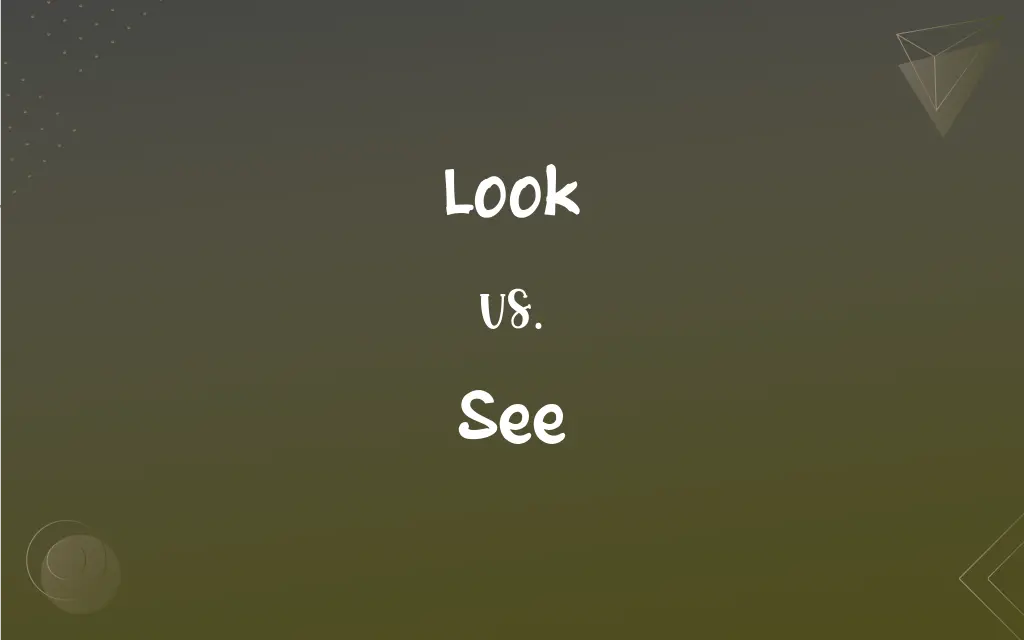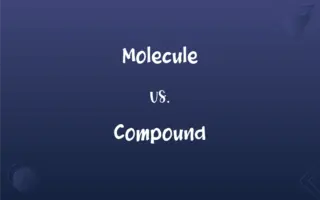Look vs. See: What's the Difference?
Edited by Aimie Carlson || By Harlon Moss || Updated on October 26, 2023
"Look" implies directing one's gaze towards something intentionally, while "see" means to perceive with the eyes.

Key Differences
"Look" often refers to a conscious action, an intentional act of directing one's eyes towards a specific object or direction. When someone is asked to "look" at something, it requires an active response to shift one's attention to that particular thing. On the other hand, "see" is more passive and is the sensory experience that follows looking or happens unintentionally. We constantly "see" things around us, but we only "look" when our attention is specifically directed.
When you "look" at something, it doesn't necessarily mean you understand or comprehend what you're observing. "Look" is about focusing the eyes. Meanwhile, to "see" can go beyond just visual perception. Sometimes, when we say we "see" something, it means we understand or recognize its significance. It's the difference between glancing at an equation and actually "seeing" its solution.
Additionally, "look" can also be used in non-visual contexts, suggesting a manner or appearance. For instance, "He looks tired." In contrast, "see" tends to stay within the realm of visual perception. You wouldn't usually say "He sees tired," but rather "He sees someone who is tired."
Finally, both "look" and "see" have idiomatic or figurative meanings. You might "look into" a matter (investigate) or "see to" a task (ensure something is done). While both words revolve around the act of perception, how they are used and what they imply can be quite different.
Comparison Chart
Nature
Intentional, Active
Passive
ADVERTISEMENT
Comprehension
Doesn't imply understanding
Can imply understanding or recognition
Usage in Context
Can be about appearance or manner
Primarily visual perception
Idiomatic Usage
"Look into" (investigate)
"See to" (ensure something is done)
Verb Forms
Look, Looking, Looked
See, Seeing, Saw, Seen
Look and See Definitions
Look
To search for or seek something.
I'll look for my keys.
ADVERTISEMENT
See
To meet or visit someone.
I'll see you at the party.
Look
To seem or appear in a particular way.
She looks happy today.
See
To understand or comprehend.
I see what you mean.
Look
To face or have a view in a specific direction.
The window looks out onto the garden.
See
To perceive with the eyes.
Can you see the bird in the tree?
Look
To direct one's gaze in a specific direction.
Please look at the board.
See
To ensure or check something.
I'll see if he's available.
Look
To expect or hope for something.
I look forward to our meeting.
See
To witness or observe something.
She saw the play last night.
Look
To employ one's sight, especially in a given direction or on a given object
Looking out the window.
Looked at the floor.
See
To perceive with the eye
Do you see the hawk in the tree?.
FAQs
What's the difference between "looking at" and "seeing" something?
"Looking at" is the act of directing gaze; "seeing" is the perception that follows.
Can "look" refer to appearances?
Yes, like in the phrase "She looks tired."
What does "look" primarily imply?
"Look" often means to intentionally direct one's gaze towards something.
Can "see" have non-visual meanings?
Yes, like in "I'll see to it" which means to ensure something is done.
Does "look" always require an object?
No, one can "look" without specifying at what.
What does "look forward to" mean?
It means to anticipate or expect something with pleasure.
How does "look" differ in present and past tenses?
It goes from "look" to "looked."
Does "look" always require a specific direction?
No, you can just "look around" without a specific focus.
Can "see" imply a visit?
Yes, like in "I went to see my grandmother."
Is "look" always related to vision?
Mostly, but it can also refer to appearance or manner.
What's the past participle of "see"?
It's "seen."
Can "look" be used figuratively?
Yes, like in "look on the bright side."
How is "see" used in casual meetings?
It's used as in "See you later!"
Can "see" imply a prediction?
Yes, like in "I don't see this ending well."
Is "see" always a passive action?
Mostly, as "see" often refers to the act of perceiving with the eyes without intent.
Can "look" imply seeking?
Yes, like in "look for" which means to search for something.
Does "see" always require an object?
No, you can say "I can see" without specifying what you see.
How is "see" used in terms of understanding?
Like in "I see your point." which means "I understand your perspective."
Does "see" imply understanding?
It can, as in the phrase "I see what you mean."
Is "look into" about vision?
Not always, it can mean to investigate something.
About Author
Written by
Harlon MossHarlon is a seasoned quality moderator and accomplished content writer for Difference Wiki. An alumnus of the prestigious University of California, he earned his degree in Computer Science. Leveraging his academic background, Harlon brings a meticulous and informed perspective to his work, ensuring content accuracy and excellence.
Edited by
Aimie CarlsonAimie Carlson, holding a master's degree in English literature, is a fervent English language enthusiast. She lends her writing talents to Difference Wiki, a prominent website that specializes in comparisons, offering readers insightful analyses that both captivate and inform.































































